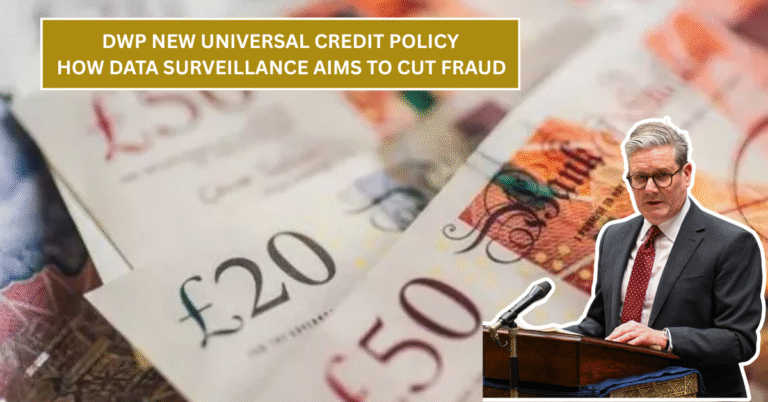
The UK Department for Work and Pensions (DWP) has recently shared an important update about its new plan to monitor benefits claimants. This update aims to focus on reducing fraud and saving public money. The government announced a two-year pilot program, set to expand in 2026, targeting only high-value fraud cases involving amounts over £5,000. This initiative is designed to be fair, avoiding any bulk phone-tracking techniques.
This news may raise questions among people who rely on benefits and those interested in government policies. It’s essential to understand the details of this plan, how it will be implemented, and what changes we can expect in the near future. Let’s explore what the DWP’s latest announcement means for benefits claimants and the wider public.
What is the New Surveillance Plan About?
This Article Includes
The Department for Work and Pensions is starting a two-year pilot project focused on monitoring fraudulent claims made by benefits recipients. This project will expand in 2026 if successful. The goal is to catch fraudsters who illegally claim large sums of money, specifically cases involving over £5,000.
Unlike some fears, there will be no mass or bulk tracking of phone data from regular claimants. Instead, authorities will concentrate their efforts only on suspect cases where high-value fraud is likely. This means ordinary people receiving benefits won’t be under blanket surveillance.
Why Is the Government Doing This?
Fraud in the benefits system costs the UK government millions of pounds each year. The DWP believes that by focusing surveillance on bigger fraud cases, they can reduce this financial loss and protect public funds. This money can then be used to support people who genuinely need assistance.
Additionally, the government wants to restore public trust in the welfare system. By showing that they are serious about tackling fraud, they hope to ensure that benefits go to the right people, making the system fairer for everyone.
Concerns About Privacy and Bulk Tracking
One major concern among the public is about privacy, especially regarding phone tracking. The DWP has made it clear that it will not track phones in bulk or use mass surveillance. Only specific fraud cases that involve large sums will be investigated with such methods, and with proper legal oversight.
This approach aims to protect the privacy of the majority of benefits claimants who have not committed fraud. The government wants to avoid any unnecessary intrusion into people’s personal lives while still stopping serious fraud.
How Will the Pilot Program Work?
The current two-year pilot program started with strict rules and guidelines. Investigators use data carefully to identify suspicious cases. When a case looks like it involves big fraud, they may use phone data and other evidence to confirm their suspicions.
If this pilot proves successful in reducing fraud and saving costs, the government plans to expand it in 2026. The expansion would allow more high-value fraud cases to be monitored and investigated using these tools.
What Does This Mean for Benefits Claimants?
If you are a benefits claimant, it’s important to know that this plan won’t affect you unless there is a strong suspicion of serious fraud. Ordinary claimants who follow the rules should not worry about being monitored.
For those who might be tempted to commit fraud, this announcement sends a warning that the government is increasing its efforts to catch large-scale fraudsters. The DWP wants to make sure benefits reach the people who genuinely need them.
How Can You Protect Yourself?
The best way to avoid any issues is to ensure that all your benefit claims are accurate and truthful. Keep good records and inform the DWP immediately if there are changes in your circumstances, such as a change in income or household members.
If you are contacted by the DWP for any reason, respond promptly and provide any information requested. Being honest and cooperative can help prevent misunderstandings or unnecessary investigations.
Looking Ahead: What to Expect in 2026 and Beyond
The government plans to review the outcomes of the pilot program before the end of the two years. If it meets its goals, the surveillance scheme will expand, focusing even more on stopping large-scale benefit fraud. This could mean new laws or procedures designed to streamline fraud detection.
At the same time, advocacy groups and privacy experts will likely continue to watch closely. Balancing fraud reduction with protecting individual rights will remain a key concern as these policies develop.
Conclusion
The DWP’s new surveillance plan aims to tackle benefit fraud more effectively by focusing on high-value cases rather than mass monitoring. While this may improve the fairness of the benefits system and save public money, privacy protections remain an important part of the strategy.
As this pilot program expands in 2026, benefits claimants should stay informed and ensure their claims are accurate. By understanding the government’s approach, people can feel more secure and confident about the future of welfare support in the UK.






